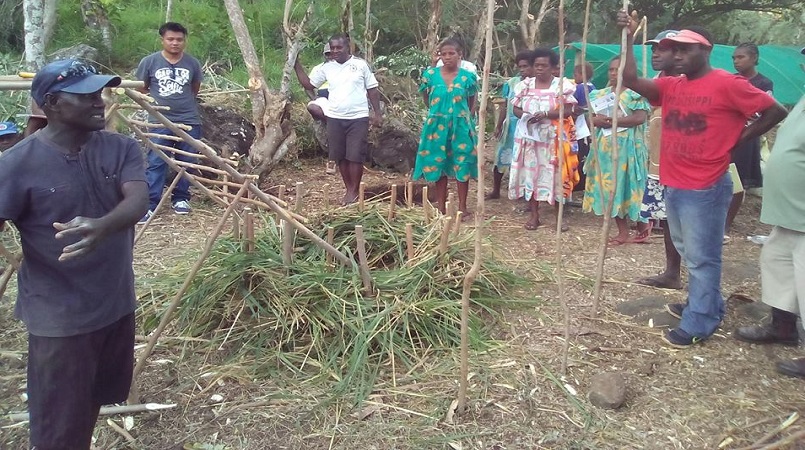
We’ve all heard about and seen the effects of El Nino on Vanuatu’s food security this year: Crops dying, rivers drying up and people traveling long distances to find enough water to drink, cook and clean.
But now that we are passed the El Nino period, scientists are warning that another climate extreme may be coming our way: La Nina. We are on a La Nina “Watch”, with a more than 50% likelihood of La Niña forming later in 2016 according to the World Meteorological Organization (WMO).
The last time we experienced a La Nina in Vanuatu was in 2010-2012, and it caused huge problems for our farmers. La Nina brings above normal rainfall to most of Vanuatu, causing flooding, water-logged soils, washed out market roads and additional pests and diseases to crops.
After the devastating impacts from Cyclone Pam and the severe El Nino of 2015/2016, farmers on Nguna, Pele & Emao are taking no chances. With the help of a Ministry of Agriculture DEZA Resilience program, supported by the Swiss & German governments, SHEFA province and the Nguna-Pele Marine and Land Protected Area Network, farmers have started constructing special backyard gardens with special La Nina focused adaptations.
Offering a package of backyard garden material, extension officers from the Department of Agriculture, SPC/GIZ and SHEFA province ran comprehensive trainings this week for over 100 farmers on each of the islands of Nguna, Pele and Emao. At the trainings, farmers learned how to construct the simple backyard garden, protected from the potential impacts of La Nina by raised seed trays, elevated planting beds and polybags, organic pesticides, and off-season coverings and treatments. The package of materials, subsidized by the Swiss-German DEZA project, includes everything farmers need to get started growing vegetables that are resilient to climate variability from El Nino and La Nina. The most surprising part of the training for farmers was the advice about a potential La Nina towards the end of 2016. “We survived Cyclone Pam, and are just recovering from the El Nino drought; now we have to start thinking about La Nina and the rain it may bring…farming is becoming harder and harder to do now with climate change,” said Emao farmer Sandy Oscar.
Backyard gardens are only one component of the DEZA II food security program being rolled out on Nguna, Pele and Emao by the Ministry of Agriculture, SPC/GIZ & SHEFA Province to strengthen local food security. Each of the 22 communities and 5 schools has been working on food-security related developments since March of 2015. These activities have included community gardens, solar cookers, backyard poultry and now backyard gardens. The goal is for at least 200 individual households to have access to their own-grown fresh and healthy vegetables by the end of 2016 despite ongoing climate challenges.
The workshops were facilitated by the Department of Agriculture’s Robinson Solomon as well as local farming expert Mr. John Epot, who worked with SPC/GIZ to design the climate-proofed backyard garden. Through a combination of classroom lessons and practical exercises with seed sowing, transplanting and vegetable maintenance, both female and male farmers learned everything they needed to know for successfully growing vegetables in their backyards. Mr. Solomon reminded participants to “start small,” but that they must take climate and disaster preparedness very seriously for food security.
Four farming cooperatives have been established on Nguna, Pele and Emao in order to support the backyard farmers through the growing, harvesting and marketing of their vegetables. Chairman of the Nguna-Pele Marine and Land Protected Area Network, Mr. Tatu Whitely, explained that “farmers pay for the backyard garden materials at a subsidized price, ensuring that people see an economic value in their garden, with the proceeds going directly to the island farming cooperatives to fund future activities to support local farmers.”
